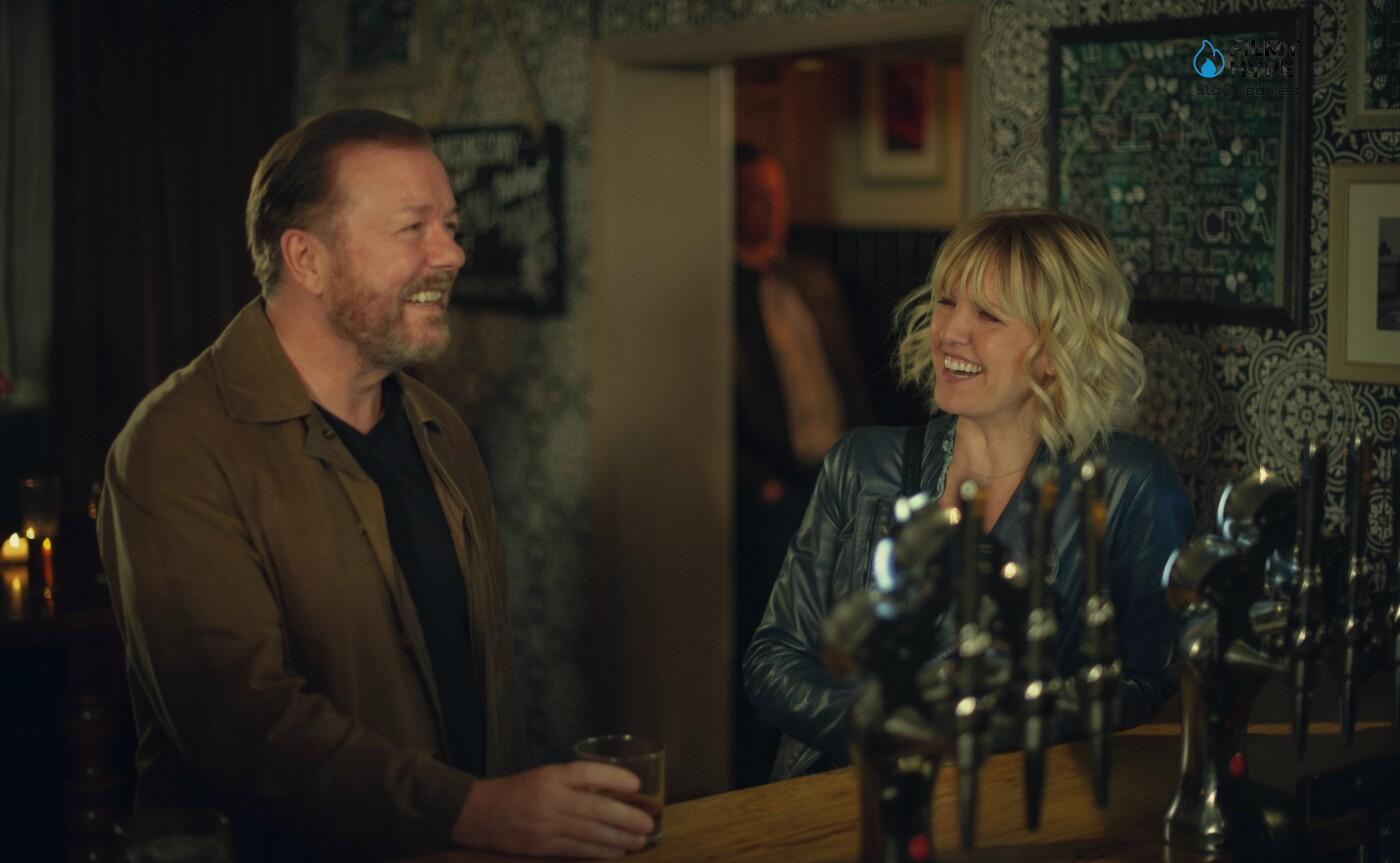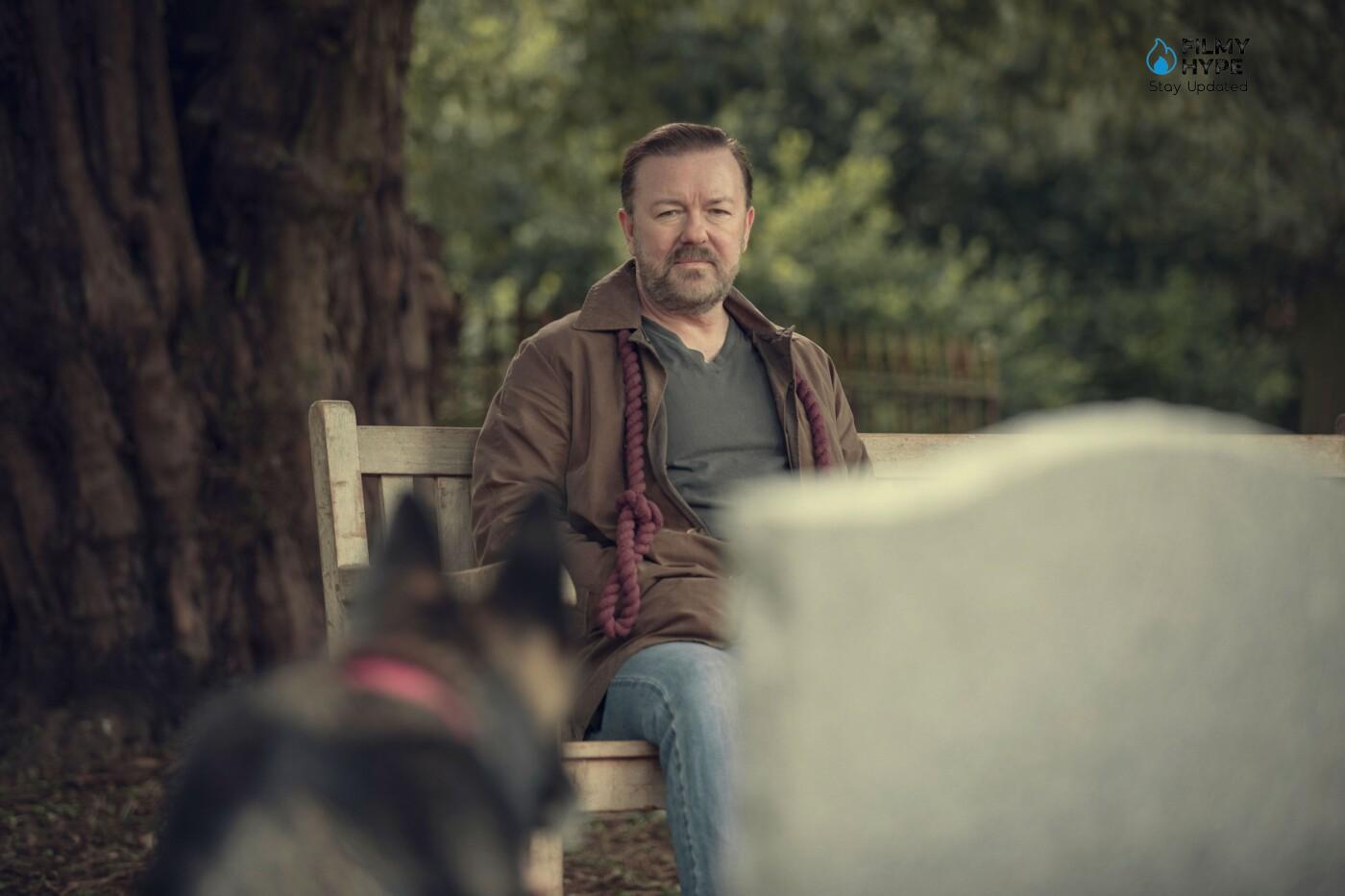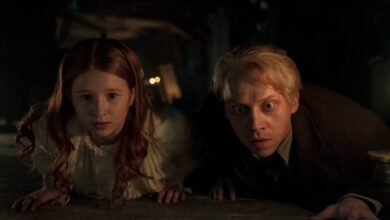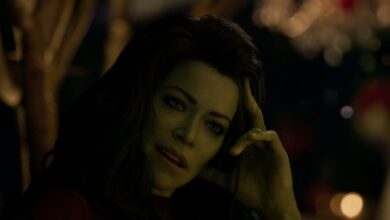After Life 3 Review: The End Is Just The Beginning The Mix Of Humor And Drama
Director: Ricky Gervais
Starring: Ricky Gervais, Tom Basden, Tony Way
Streaming Platform: Netflix (click to watch)
Filmyhype Ratings: 4/5 (four star)
After Life 3 Review: The mind is an intricate labyrinth of tangled thoughts, imprisoned along dead-end streets; they are memories that can’t find a branch, sneaking into the darkest depths of memory to become the same stuff our brain matter is made of. A busy intersection, an unprecedented roundabout, in which regrets slam into an accidental head-on against our present, affecting it with an imprint that only so much willpower and courage can heal and rebuild. Nothing seems to have changed in Tony’s (Ricky Gervais) life when in reality, as we will point out in our After Life 3 review, everything is different.

After Life 3 Review: The Story
A strange energy blows on the tiny world of Tambury. A thrill of positivity takes the breath of sarcasm that hovers around Tony by the hand and launches him with different eyes towards the future. Misanthrope, gloomy, just like in previous seasons, the protagonist’s journey in these new six episodes is now undermined by flashes of light that illuminate a straighter and less wavy path, straightening a gaze previously intoxicated only by alcohol. The memory of his wife Lisa is a constant in a world of variables, but now there is a sort of acceptance, a coveted and reached maturity that prompts the protagonist to live in the company of his own memory, without allowing himself to be overwhelmed or live for it Rebellion anarchy acceptance.
The three seasons of After Life are made television screenings of those three phases of existence that shape us, create us, to the point of completing our personal formation: childhood, adolescence and maturity. The final chapter of After Life – now available on Netflix – is a journey through the life of those who remain, and those who survive in the memory, which Ricky Gervais proposes with careful clarity, usual cynicism and a touch of emotion. Yes, because unlike the previous two seasons, the latter is not afraid to push on the throttle of emotions, without going over the limits, and turn on the speed cameras of rhetoric.
After Life 3 Review and Analysis
There is something profoundly true, real, which makes this series unique, piece of a larger puzzle momentarily borrowed from the small screen and re-proposed in a metonymic version in television format. A part of a whole that in its excerpt shows the uncertainty of life, as if the viewer had the opportunity to peek into the everyday life of a few characters, so ordinary yet so special, to find a part of himself narrated on the small screen. Eventually Toby, Kath, Emma, Lenny, and widow Anne, didn’t have and still don’t own anything special. They are imperfect, and therefore perfectly characterized to the point of becoming (thanks also to the extraordinary acting skills of their performers) real, tangible, human.
The structure of After Life 3 takes up and repeats the same pattern as the previous ones, but it is in this reiteration that the magic is found. As we pointed out in the review of the second season , watching each episode of this series conceived and directed by Gervais is like (re) living parts of an existence dominated by boredom and routine, yet behind this apparent ordinariness lies the beauty of something. special, something unique that will never come back. It is the metaphor of life, the real one, the one to which we are all called to (above) live. ” My dad used to say that life is like a carousel ride: exciting frightening fast ” Tony says at one point. ” And the tour is only one. You have fun until you can’t take it anymore“. And in this rushed merry-go-round, change is scary, both in the fictional context and the one placed off the screen. And then you might as well live by clinging to the safety of a constant routine, without leaving the confines of your comfort zone. Instead, it is precisely in the lowest events, such as those narrated by Tambury Gazzette, that flashes of courage are found that will lead to final change, a mutation accomplished in small doses, but destined to show the true side of oneself.

A similar discourse can be applied to a narrative structure that, only apparently orphan of surprising plot-twists, prefers to limit itself to the repetition of a successful schematism like the one followed in the previous two seasons, to hearten the spectators, reassuring them that nothing has changed, when instead basically everything has changed. Even the references to Covid are few and sip, hinted at but never included in the narrative sector, relegating them to simple, short, extras, without ever becoming protagonists. They are small commas in well-crafted speeches that do not intend to leave room for external events that may disturb the vision. They are quick glimpses at our world, before returning to the diegetic one of Tambury.
The one proposed by After Life 3 is a firmness of events, an only apparent immobility that is also found in the modalities of a shot faithfully entrusted to fixed shots, free from large camera movements, or dynamic montages. Everything lends itself to the gaze of man, emulates it, recreates it, entrusting the uniqueness of the human eye to the lens of the camera, its recording of reality, the attentive and steady vision of the things that surround it. Ricky Gervais pays attention to every detail, but above all to the human component of his work, without letting go of every mood change, now visually translated by low gazes, by strained smiles and outlined by hidden impatience, by lively and cheerful eyes, full of hope, or bathed by tears ready to flow. A direct visual discourse, devoid of obstacles that prevent the eyes from scrutinizing, investigating the microcosm of After Life, supported by a bright photograph, but never totally brilliant, because it is veiled by a mantle of cold shades (tending to slate), conceived as a reminder chromatic of that melancholic spleen that lives and covers Tony’s aura.
With After Life 3 Ricky Gervais appropriates the reflective nature of the television screen to make his work a mirror on our incomplete, misunderstood and sometimes lonely nature. A surface that is never completely clean, stained with fingerprints, imperfect, exactly like our lives. A magic mirror, which lives, breathes to the rhythm of a heart that returns to beating fast even in a misanthrope like Tony. No happy ending at the end of the fairy tale, only a constant dialogue with one’s demons, a succession of dialogues where each word finds its place, striking the soul and undermining its memory. That labyrinthine memory, within which After Life will remain imprisoned, becoming an integral part of our baggage of vision, the backbone of the scopic nature of now satisfied spectators, a still intangible but not for this little cathartic made up of binary codes and pixels. Living the last episode of After Life is an elaboration of mourning and loss, a walk towards infinity, towards the rest of an existence that is always the same, yet always different, unpredictable, new. A life beyond life.
After Life 3 Review: The Final Words
Here filmyhype conclude this review of the third and final season of After Life by underlining how Ricky Gervais was able to conceive and make the perfect television construct without ever falling into rhetoric or easy sentimentality. True to himself, his Tony manages to mature without ever betraying himself. As Sorrentino would say, “he did not disunite” and we like this.






